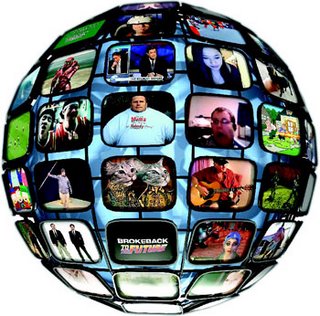
I spent yesterday looking at YouTube. Y'see, everyone goes on about it all the time and I thought I'd check it out. I began with looking at the most popular clips. Such things as someone jumping into a Christmas tree and knocking it to the ground, someone riding a bike into a lake (I wonder if whoever staged this stunt thought they were being original or have they ever seen the opening titles of The Monkees), someone doing what I only assume is a parody of a commercial that I've never seen, a Wayfarer wearing toddler playing the drums and Saddam being taunted and hanged.
After that I typed in some keywords and names to try and find something interesting and worthwhile. I assume that YouTube might be a repository for vast amounts of discarded and forgotten media that I might want to access. An interview with someone interesting. Political speeches, historical footage, nostalgic TV shows.
I was quite disappointed. I don't really want to watch clips from Conan O' Brien when I can watch it on CNBC international, neither am I interested in Morning Musume introducing yet another new member with a performance on a Japanese variety show or someone recording a Happy New Year message from in front of a Goo Goo Dolls poster.
I am sure there are some fantastic things on YouTube. Yet the effort to find them is time consuming and fraught with frustration.
Here's my point. YouTube is another example of technology in search of a use.
I listen to lots of talk radio. Here in the UK The BBC has two dedicated national talk radio stations. Much of the local BBC radio content is news and discussion based. In the past few years the more popular channels like FiveLive have built a lot of their content on interaction . Listeners can text and email their opinions, comments and responses to stories and issues. What happens is that in amongst the volumes of listener comment that pass throught the hands of the producers and presenters, it is the one-line, simplistic, bold and opinionated comments that make it to air. I suspect that it is a game some of the audience play. They can get their message or email read out by making it sensational and confrontational. And the producers and presenters just can't resist thet fact that this will prick up the ears of the casual listener. This isn't exactly the debate between listener and journalist that interactivity is sold as. It's a gimmick. My local BBC TV news show often has a section at the end where viewers responses to the day's stories are read out and shown. It operates in the same way. Opinionated people sit by their computers ready to email the local news. It is the people who feel that their opinions matter who contribute.
The rub is that opinionated people are those most likely to have daft, ill-considered, ignorant and foolish opinions. On top of that, people who feel their opinions matter are deluded. Their opinions don't matter at all. There's a nice scene somewhere in season 2 of the West Wing when (I'm paraphrasing) Bartlett hears that 76% of the public are in favour of some economic policy. His response is that he would be shocked if he could find 76 Americans who understood the complex issues enough to decide anything about it. The mistake politicians and spin people appear to be making is to think that this 'public response' - allied with the results of self selecting newspaper polls equals public opinion. On great philosophical issues - capital punishment for example - the media gives a 25 word SMS composed one-handed by someone stuck in traffic gets the same exposure as hundreds of years of thoughful, scholarly discussion.
Again, an example of a technology that is in search of a use. The gathering of public opinion by email and SMS is complex. You could argue that it is a leap forward, but I think it is looking like just a leap. It seems to be becoming ubiquitous with no discernable debate about the institutions it is undermining. I imagine lots of very clever people are writing about this in academic journals but the debate needs to be on a real level. How is this affecting my trust of the news? How is it remaking 'truth'? How is this reducing the traditional role of factual broadcasting i.e. to inform and educate? How far does this actually affect policy making?
The problem is that everyone is jumping on the bandwagon, afraid of being left behind. Journalists and editors are looking to the blogosphere and 'citizen journalists' for content, smugly feeling that they are at the cutting edge of the media whilst incidentally not having to actually resource and conduct proper journalism anymore. *
* I am not here talking about the real use of blogging and citizen journalists to bypass censorship or provide alternative news sources under restrictive conditions. I am talking about Britain, with the best publicly funded independent news source in the world and an excellent broad spread of unslavish national press.





